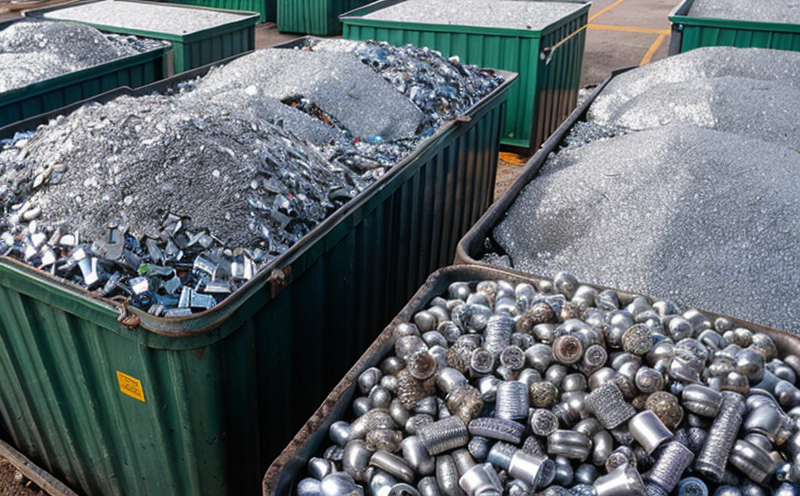ASTM E177 Recycled Metal Alloy Homogeneity Check
The ASTM E177 standard provides a method to check the homogeneity of recycled metal alloys, ensuring that materials meet specified quality and performance criteria. This service is critical for waste management and recycling testing sectors where the integrity and consistency of recycled metals are paramount.
Recycled metal alloys often undergo various processing steps such as shredding, sorting, and melting before being reused in manufacturing processes. These processes can introduce variations in material composition that may affect product performance if not properly controlled. The ASTM E177 test helps identify any inconsistencies or variations within the recycled alloy batches by measuring their homogeneity.
The procedure involves taking a representative sample from the batch of recycled metal and analyzing it for specific chemical elements using spectrographic methods, X-ray fluorescence (XRF), or other suitable analytical techniques. The goal is to ensure that all parts of the material have similar compositions across the entire batch.
For instance, in the production of stainless steel, maintaining consistent chromium content throughout a batch ensures the alloy retains its corrosion resistance properties. Similarly, for aluminum alloys used in automotive components, ensuring homogeneity helps prevent cracking and other defects during manufacturing processes.
The ASTM E177 test is particularly useful when dealing with mixed metal streams or scrap piles that contain different types of metals. By separating out these materials based on their composition through this test, manufacturers can optimize their recycling processes and produce higher quality end products.
Compliance with this standard not only ensures product quality but also supports environmental sustainability goals by promoting efficient use of resources derived from waste streams. This service plays a crucial role in upholding industry standards and ensuring that recycled metals meet the same rigorous requirements as newly mined raw materials.
In summary, the ASTM E177 Recycled Metal Alloy Homogeneity Check is an essential tool for maintaining consistency in recycled metal alloys throughout various stages of production. It provides valuable insights into batch quality control by identifying potential issues early on, thereby reducing costly rework and improving overall process efficiency.
Eurolab Advantages
At Eurolab, our commitment to delivering accurate and reliable results sets us apart in the field of waste management and recycling testing. Here are some key advantages that come with choosing us for your ASTM E177 Recycled Metal Alloy Homogeneity Check:
- Experienced Specialists: Our team consists of highly skilled professionals who possess extensive knowledge and expertise in metal alloy analysis.
- State-of-the-Art Equipment: We utilize cutting-edge instrumentation to ensure precise measurements and accurate data collection.
- Comprehensive Reporting: Every test result is accompanied by detailed reports that provide clear insights into the composition and quality of your recycled metal batches.
- Fast Turnaround Time: We understand the importance of timely results in production processes, so we strive to deliver quick turnaround times without compromising on accuracy.
- Comprehensive Training Programs: Our clients can benefit from our training programs designed to enhance their understanding and application of these standards.
By partnering with Eurolab for your ASTM E177 Recycled Metal Alloy Homogeneity Check, you gain access to a wealth of experience, advanced technology, and robust support systems that will help drive your business forward.
Why Choose This Test
The importance of checking the homogeneity of recycled metal alloys cannot be overstated. Inconsistent compositions can lead to significant quality issues in end products, impacting both performance and safety standards. Here’s why choosing this test is crucial:
- Ensures Consistency: Ensuring that all parts of a batch have similar compositions helps maintain product consistency across production runs.
- Promotes Quality Control: Regular checks allow for early detection and correction of any discrepancies, preventing substandard materials from entering the supply chain.
- Enhances Safety Standards: Inconsistent alloys can pose risks during manufacturing or use if they do not meet specified performance criteria. This test helps mitigate such hazards.
- Sustains Environmental Goals: Efficient resource utilization is a core component of sustainable practices. By ensuring high-quality recycled metal batches, this test supports broader environmental initiatives aimed at reducing waste and conserving natural resources.
- Facilitates Regulatory Compliance: Adhering to international standards like ASTM E177 ensures that your operations meet regulatory requirements, providing peace of mind for both internal teams and external stakeholders.
Incorporating this test into your quality assurance protocols is a proactive step towards maintaining excellence in recycled metal alloy production. It not only enhances product reliability but also contributes to building trust with customers and partners.
Use Cases and Application Examples
| Application | Description |
|---|---|
| Stainless Steel Recycling | Ensuring consistent chromium content across batches enhances corrosion resistance in end products. |
| Aluminum Alloy Production | Avoiding variations in aluminum alloys prevents manufacturing defects and ensures product quality. |
| Copper Recycling | Maintaining homogeneity improves conductivity properties in copper-based electrical components. |
| Recycling Mixed Metal Streams | Identifying and separating different metal types based on their compositions ensures efficient resource utilization. |
These examples illustrate how the ASTM E177 Recycled Metal Alloy Homogeneity Check plays a vital role in various sectors of waste management and recycling. By applying this test, businesses can ensure high-quality recycled metal alloys that meet stringent industry standards.





